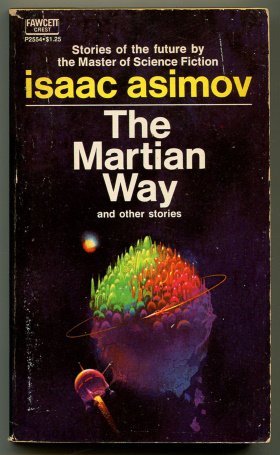‘An Empire of all men-all brothers-eventually all free. . . .
‘If history could be changed. If that first great failure could have been prevented—’
And I stopped at that point.
‘Well?’ said the Boss.
‘Well,’ I said, ‘I think it isn’t difficult to connect all that with the fact that Tywood blew an entire power plant in his anxiety to send something back to the past, while in his office safe we found sections of a chemistry textbook translated into Greek.’
His face changed, while he considered.
Then he said heavily: ‘But nothing’s happened.’
‘I know. But then I’ve been told by 1).rwood’s student that it takes a day to move back a century in time. Assuming that ancient Greece was the target area, we have twenty centuries, hence twenty days.’
‘But can it be stopped?’
‘I wouldn’t know. Tywood might, but he’s dead.’
The enormity of it all hit me at once, deeper than it had the night before—
All humanity was virtually under sentence of death. And while that was merely horrible abstraction, the fact that reduced it to a thoroughly unbearable reality was that I was, too. And my wife, and my kid.
Further, it was a death without precedence. A ceasing to exist, and no more. The passing of a breath. The vanishing of a dream. The drift into eternal non-space and non-time of a shadow. I would not be dead at all, in fact. I would merely never have been born.
Or would I? Would I exist – my individuality – my ego – my soul, if you like? Another life? Other circumstances?
I thought none of that in words then. But if a cold knot in the stomach could ever speak under the circumstances, it would sound like that, I think.
The Boss moved in on my thoughts – hard.
‘Then we have about two and a half weeks. No time to lose. Come on.’
I grinned with one side of my mouth: ‘What do we do? Chase the book?’
‘No,’ he replied coldly, ‘but there are two courses of action we must follow. First, you may be wrong – altogether. All of this circumstantial reasoning may still represent a false lead, perhaps deliberately thrown before us, to cover up the real truth. That must be checked.
‘Secondly, you may be right – but there may be some way of stopping the book: other than chasing it in a time machine, I mean. If so, we must find out how.’
‘I would just like to say, sir, if tpis is a false lead, only a madman would consider it a believable one. So suppose I’m right, and suppose there’s no way of stopping it?’
‘Then, young fellow, I’m going to keep pretty busy for two and a half weeks, and I’d advise you to do the same. The time will pass more quickly that way.’
Of course he was right.
‘Where do we start?’ I asked.
‘The first thing we need is a list of all men and women on the government payroll under Tywood.’
‘Why?’
‘Reasoning. Your specialty, you know. Tywood doesn’t know Greek, I think we can assume with fair safety, so someone else must have done the translating. It isn’t likely that anyone would do a job like that for nothing, and it isn’t likely that Tywood would pay out of his personal funds – not on a professor’s salary.’
‘He might,’ I pointed out, ‘have been interested in more secrecy than a government payroll affords.’
‘Why? Where was the danger? Is it a crime to translate a chemistry textbook into Greek? Who would ever deduce from that a plot such as you’ve described?’
It took us half an hour to turn up the name of Mycroft James Boulder, listed as ‘Consultant,’ and to find out that he was mentioned in the University Catalogue as Assistant Professor of Philosophy and to check by telephone that among his many accomplishments was a thorough knowledge of Attic Greek.
Which was a coincidence – because with the Boss reaching for his hat, the interoffice teletype clicked away and it turned out that Mycroft James Boulder was in the anteroom, at the end of a two-hour continuing insistence that he see the Boss.
The Boss put his hat back and opened his office door.
Professor Mycroft James Boulder was a gray man. His hair was gray and his eyes were gray. His suit was gray, too.
But most of all, his expression was gray; gray with a tension that seemed to twist at the lines in his thin face.
Boulder said, softly: ‘I’ve been trying for three days to get a hearing, sir, with a responsible man. I can get no higher than yourself.’
‘I may be high enough,’ said the Boss. ‘What’s on your mind?’
‘It is quite important that I be granted an interview with Professor Tywood.’
‘Do you know where he is?’
‘I am quite certain that he is in government custody.’
‘Why?’

























